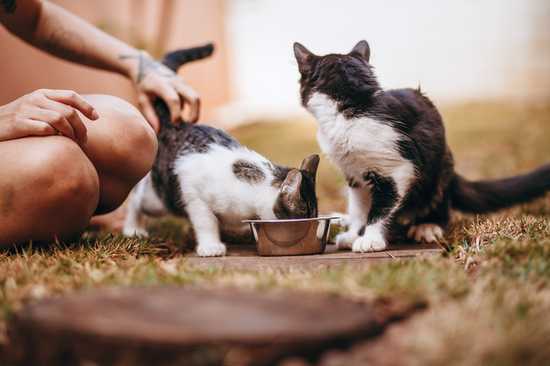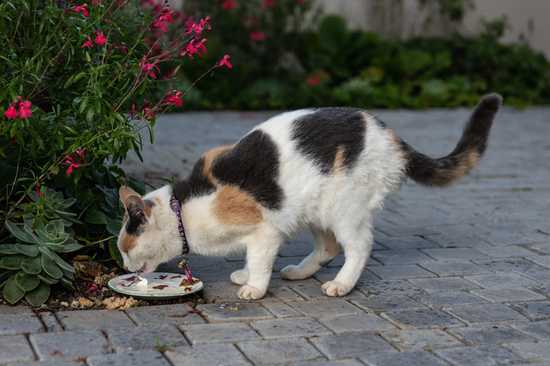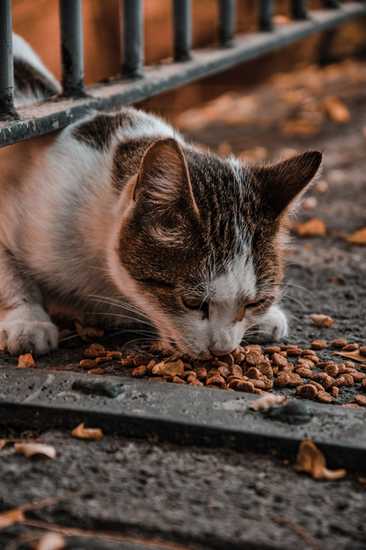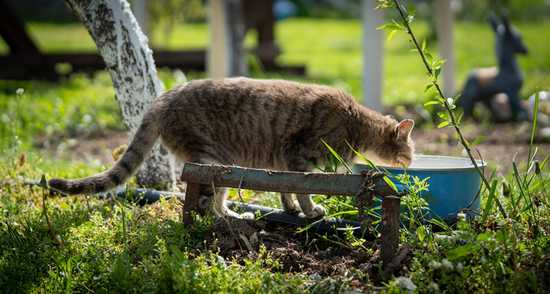Nectarines contain a lot of vitamin A and C, and nectarine seeds contain a small amount of cyanide.
Cyanide can be harmful to cats and humans. But the levels found in nectarines are not high enough to cause serious harm.
Cooking the fruit will also destroy the cyanide and make it easier for your cat to digest.
Nectarines and other fruits and vegetables can use as treats for your cat. But should not form the main part of their diet.
Cats also need to eat animal proteins such as beef, and chicken. Or fish to get all the essential amino acids they need for good health.

The best part of summer is all the delicious fruit that ripens to juicy perfection in the hot months. Our homes have fruit bowls full of stone fruits to snack on. Nectarines are one of these favourite sweet summer treats.
Sure, you can share these fruits with your human friends, but what about your feline friends? Can cats eat nectarines?
Yes, cats can eat nectarines. But, they should only eat the fleshy part of the fruit and never the stone, leaves, or stems. As they contain cyanide1, which is toxic to cats in concentrated doses. If cats given any fruit, it should always given in small amounts and rarely as a treat. As this is not in keeping with their natural diet.
Feeding your cat nectarine will usually be fine. But there are a few key considerations to ensure your cat’s health and safety. Keep reading to learn more!
Are nectarines good for cats?
Nectarines are a great source of vitamins, minerals, and fibre.
Your cat will receive health benefits from eating nectarines. Such as improved skin and coat, and healthy weight management. And a stronger immune system.
They also get some fibre, which can help with digestion and hair prevention.
Is it bad for cats to eat nectarines?
Nectarines are not bad for your cat, but some parts of the fruit can be a little dangerous.
Nectarine leaves and seeds contain small amounts of hydrogen cyanide. Which can harm both pets and humans when consumed.

Hydrogen cyanide poisoning in cats causes weakness, abnormal breathing, collapse, and even death.
Remove all remaining nectarine skin and fruit pits from your cat’s reach.
It is also important to keep small children away from these parts of the fruit. As they can make a big mess if they try to eat or play with them.
Can cats eat nectarines even if they have cyanide?
Yes, they eat them all the time in the wild, and it doesn’t hurt them at all.
Our pets are unlikely to exposed to as much cyanide as our ancestors were due to modern farming methods. (it used to be more prevalent in some foods than humans understood how to grow them without it).
When your cat eats nectarines, the cyanide metabolized and converted into thiocyanate. Which is much less toxic than hydrogen cyanide.
This by-product is then excreted in the urine and feces. Meaning it does not build up in their bodies to dangerous levels.
Cats need to eat some animal protein in their diet. But occasional, you can add nectarines and other fruits and vegetables.
Nectarines are not bad for your cat and will give them the great nutrients they need.
Can kitten eat nectarines?
Yes, kittens can eat nectarines.
Nectarines aren’t bad for your kitty either. And will provide them with some excellent nutrients they need.
Nectarines are not too high in fat or sugar. So you don’t have to worry about extra pounds or energy on your growing kitten’s body.
They contain a fair amount of natural sugars. Which may make them more palatable to your feline friend.
Nectarines are also very high in vitamin A and C. But like in humans. Too much can cause upset stomachs in kittens. (you’ll know if they have too much because you’ll see yellow droppings).
Healthy benefits of nectarines:
Cats completely compel carnivores, so they do not need any plant matter such as fruit in their diet. They can live only on a meat diet and synthesize all the essential amino acids they need from animal matter.
The cat will benefit if nectarines gave as a treat. But since they should only be getting minimal amounts of fruit. These benefits will likely make a noticeable difference to your cat’s health.
Nectarines are high in vitamins. Especially vitamins A and C. Vitamin C is not required in a cat’s diet. As they can synthesize this particular vitamin in their liver. Vitamin C is well known for boosting the immune system and helping the body absorb iron. So extra vitamin C can be beneficial for your cat.
Nectarines also contain a lot of fibre and water. The fibre will help support a healthy digestive system. And the extra water will help keep your cats hydrated.
As already mentioned, nectarines should only given to cats as a rare treat. Like many other fruits. Nectarines have high sugar content, main sucrose and fructose. Which cats do not need. Excess sugar can contribute to obesity and diabetes. Besides, an excess of fruit can reduce the consumption of suitable food for your cat. And the cat can suffer from malnutrition.
Are nectarines safe for cats?
Unlike dogs, cats are not attracted to sweeter human foods such as fruit. This is because cats cannot taste or recognize sweetness.
So if you offer nectarines to your cat, you may meet with indifference. Or, some cats like to try foods they see us eating or are curious about. So they may accept the taste of nectarines.
Cats that indulge in some nectarines don’t need to worry, as nectarines are safe for them. The fleshy part of the fruit is completely safe for cats to eat, while the skin is safe. If cut into small pieces, the leather skin can be a choking hazard if offered in inappropriate sizes.
But, nectarines’ pit, leaves, and stems are not safe for cats. All these parts of the fruit contain cyanide, and all pose a choking hazard. Cyanide is unlikely to cause serious problems unless consumed in large quantities. So if your cat ingests a small amount, don’t panic!
Several other fruits also have cyanogenic glucosides in their seeds or pits, such as:
1. Cherries
2. plums
3. Apricots
4. Peaches
5. apples
6. Pears
7. Mangoes
Some of these stone fruits, including nectarines. Come in two different varieties: loose-seeded and sticky-seeded. A freestone means that the large stone is not attached to the fruit’s pulp. And can be easy removed by cutting the fruit open. Cling-stone varieties have the same stone. But the stone attached to the pulp inside the fruit, making it difficult to remove all traces of the stone.
Loose-seeded varieties are the best choice in nectarines if you will be offering them to your cat. As there will be no residual seed compounds on the pulp that can be harmful.
User questions:

Can cats eat nectarines or peaches?
Stone fruits such as apricots, plums, peaches, and cherries. And nectarines can be a tasty treat for your pet. But keep in mind that the stones should not swallowed.
Is it permissible for cats to eat peaches?
Peach pulp is not harmful to cats. But, cats may not tolerate peach meat well and may experience gastrointestinal problems. But, the leaves, stems, and seeds (kernels) contain cyanide. They are extreme dangerous to cats, other animals, and humans.
Peaches are one of the fruits that cats can eat:
As mentioned, peel the peach and feed the cat only the pulp. Cut it into manageable pieces and serve only a few servings at a time. Also, always use fresh peaches. Preservatives or sweeteners in canned peaches can cause gastrointestinal distress in your cat.
What does my cat love about avocados?
Here are a few reasons avocado pulp is good for cats: High protein content. Avocados are a good source of high-quality protein for cats. Because they contain 18 amino acids. Since cats are compel carnivores, protein is essential for various biological activities.
Is it possible for cats to eat applesauce?
Although applesauce may seem harmless, manufactured applesauce can contain chemicals and preservatives. That a whole apple would not. But, if you make homemade applesauce and your cat eats a few licks. It will not harm her as purees are easier for cats to digest.
Final thought:
As tempting as sharing human food with your cat may be, you should limit the amount of “human food” you offer them. Fruits such as nectarines will not harm your cat. If they given in small amounts, if they have given infrequent, and if they prepared safe.
Nectarines can offer a slight health boost when served as a rare treat. And can also provide entertainment and enrichment for your curious kitty!

